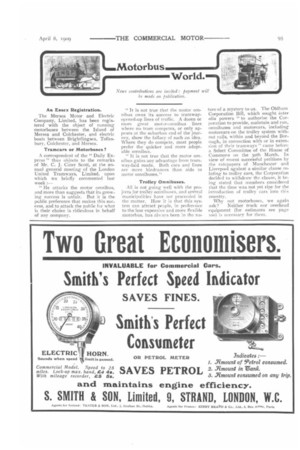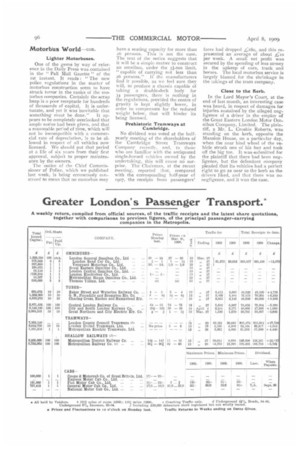World.
Page 5

Page 6

If you've noticed an error in this article please click here to report it so we can fix it.
An Essex Registration.
The Mersea Motor and Electric Company, Limited, has been registered with the object of running motorbuses between the Island of Mersea and Colchester, and electric boats between Brightlingsea, Tonesbury, Colchester, and Mersea.
Tramcars or Motorbuses?
A correspondent of the " Daily Express " thus objects to the remarks of Mr. C. J. Cater Scott, at the annual general meeting of the London United Tramways, Limited, upon which we briefly commented last week :— " He attacks the motor omnibus, and more than suggests that its growing success is unfair. But it is the public preference that makes this success, and to attack the public for what is their choice is ridiculous in behalf of any company.
" It is not true that the motor omnibus owes its success to tramwayopened-up lines of traffic. A dozen or more great motor-omnibus lines where no tram competes, or only appears at the suburban end of the journey, show the fallacy of such an idea. Where they do compete, most people prefer the quicker and more adaptable omnibus.
" It is not true that the motor omnibus gains any advantage from tramway-laid roads. Both cars and lines are more hindrances than aids to motor omnibuses."
Trolley Omnibuses.
All is not going well with the projects for trolley omnibuses, and several municipalities have not procoeded in the matter. How it is that this system can attract people, in preference to the less expensive and more flexible motorbus, has always been in the na
ture of a mystery to us. The Oldham Corporation Bill, which sought inter alia powers "to authorise the Corporation to provide, maintain and run, omnibuses and motorcars, including motorcars on the trolley system without rails, within and beyond the Borough, in connection with or in exten,,ion of their tramways " came before a Select Committee of the House of Commons on the 3oth March. In view of recent successful petitions by the ratepayers of Manchester and Lives-pool against a similar clause relating to trolley cars, the Corporation decided to withdraw the clause, it being stated that members considered that the time was not yet ripe for the introduction of trolley cars into this country.
Why not motorbuses, we again
ask? Neither track nor overhead equipment (for estimates see page too) is necessary for them. Lighter Motorbuses.
One of the gems by way of reference in the Daily Press was contained in the " Pall Mall Gazette" of the 1st instant. It reads : " The new police regulations in the matter of motorbus construction seem to have struck terror in the ranks of the motorbus companies. Certainly the scrap heap is a poor receptacle for hundreds of thousands of capital. It is unfortunate, and yet it was inevitable that something must be done." It appears to be completely overlooked that ample notice had been given, and that a reasonable period of time, which will not be incompatible with a commercial rate of depreciation, is to be allowed in respect of all vehicles now licensed. We should put that period at a life of six years from their first approval, subject to proper maintenance by the owners.
The notice of the Chief Commissioner of Police, which we published last week, is being erroneously construed to mean that no motorbus may have a seating capacity for more than 26 persons. This is not the case. The text of the notice suggests that it will be a simple matter to construct an omnibus, under the 3i-ton limit, "capable of carrying not less than 26 persons." If the manufacturers find it possible, as we feel sure they will, to produce a chassis capable of taking a double-deck body for 3.} passengers, there is nothing in the regulations, provided the centre of gravity is kept slightly lower, in order to compensate for the reduced weight below, that will hinder its being licensed.
Prehistoric Tramways at Cambridge.
No dividend was voted at the halfyearly meeting of the shareholders of the Cambridge Street Tramways Company recently, and, to those who are familiar with the antiquated single-horsed vehicles owned by the undertaking, this will cause no surptise. The Chairman, at the recent meeting, reported that, compared with the corresponding half-year of 1907, the receipts from passengers'
fares had dropped ;;;;28o, and this re
presented an average of about to per week. A small net profit was secured by the spending of less money. in the upkeep of cars, track and horses. The local motorbus service is largely blamed for the shrinkage ia the takings of the tram company.
Close to the Kerb.
In the Lord Mayor's Court, at the end of last month, an interesting case was heard, in respect of damages for injuries sustained by the alleged negligence of a driver in the employ of the Great Eastern London Motor Om.. nibus Company, Limited. The plaintiff, a Mr. L. Crosbie Roberts, was standing on the kerb, opposite the Mansion House, on a particular day, when the near hind wheel of the vehicle struck one of his feet and took off the big toe. It was submitted for the plaintiff that there had been negligence, but the defendant company pleaded that its vehicles had a perfect right to go as near to the kerb as thedrivers liked, and that there was no negligence, and it won the case.


















